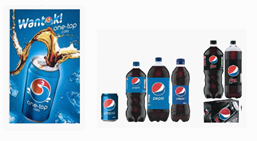Riding on the Surfer’s Wave of Reputation and Goodwill – How Pepsi popped bubbles of a look-a-like coke brand
Written by Briffa | April 16, 2018
PepsiCo successfully fizzed the bubbles out of a ‘look-a-like’ cola brand after winning a cancellation and invalidity application against Singapore-based Ten Yun International’s trade mark at the UK Intellectual Property Office.
Registered in October 2016 and shown below at Fig. 1, Ten Yun International’s mark covered ‘soft drinks and non-alcoholic drinks’ in Class 32. The mark features a blue red/orange and white swirl pattern inside a circle with a white silhouette of a surfer on a surfboard.
PepsiCo Inc. registered their marks in the UK and EU also covering non-alcoholic and soft drinks. Both logo marks feature the iconic swirl pattern inside a circle, using colours, red, white and blue (Figs. 2&3). Although the marks have been used in the UK since 2009, the iconic, ‘Pepsi Globe’ symbol has been used in branding since 1991. Forbes also voted Pepsi the 29th most valuable brand in the world.
Fig1 Figs 2 and 3
PepsiCo decided to challenge Ten Yun’s trade mark as it felt it had adopted a look-a-like product in order to compete with their products. Looking at the both marks used in their marketing, the similarities from a distance are uncanny:
Despite both the marks containing a circular device as its central element, divided into irregular red/orange, white and blue sections, the IPO actually concluded a low degree of similarity between the marks: Ten Yun’s mark has a white silhouette of a surfer in its mark, a concept which is absent from Pepsi’s marks. As a result, both trade marks are mildly conceptually different.
The aspects that were key to Pepsi successfully invalidating Ten Yun’s mark were based on 2 factors:
- Pepsi’s marks being displayed on a blue background, just like Ten Yun’s trade marks convey ‘an additional point of similarity’ and is a feature recognised as part of Pepsi’s branding- this was therefore included as an aspect of consideration by the UK IPO; and
- Soft drinks are not ‘an expensive or highly considered purchase’. Since they are impulse purchases, consumers in general do not pay that much attention when choosing a product of this sort and so grabbing a product in haste would inadvertently lead to unfair competition between the products as they are more than likely to appear side-by-side in a chiller cabinet/shelf.
Therefore, this meant that the issue of Ten Yun International unfairly taking advantage of Pepsi’s branding was the crux of the matter. Soft drinks are not particularly expensive or considered purchases meaning consumers tend to spend less attention when selecting products from the shelf. Therefore in circumstances such as these, the visual similarities and differences between the marks become more relevant. Even though the likelihood of confusion claim failed, the UK IPO stated that due to the way the products were bought, Ten Yun’s mark would still provide some mental link to Pepsi’s trade marks for a ‘significant section of the public’.
Based on the above, the UK IPO also declared the trade mark invalid, ordering Ten Yun to pay Pepsi £2,250 as a contribution towards Pepsi’s costs.
Briffa comment
Invalidating and therefore cancelling already registered logo marks at the UK IPO and EU IPO are generally difficult to ensure a favourable outcome. Logo marks protect you for elements as seen and so it’s often much harder to show likelihood of confusion based on visual and conceptual similarities in invalidity applications. Since no words were used on either trade mark, aural similarities could not be considered.
What led to Pepsi’s success however, was the high strength of its reputation, not just globally, but in the UK (where Pepsi holds 5% of the UK market for carbonated soft drinks) coupled with the fact that since the get-up of Ten Yun’s product is so similar to Pepsi’s get-up, a product which is generally bought quickly for on-the-go sustenance would cause a company to unfairly take advantage of and/or compete with another company’s brand.
Please note images contained in the body of the blog have been obtained from the invalidity judgment at the EU IPO and are used for illustrative/educational purposes in this blog post.



